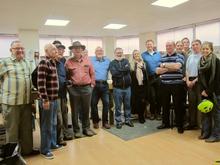Strengthening the Regional Engagement Role of Universities in Africa and Asia
Strengthening the Regional Engagement Role of Universities in Africa and Asia builds on the work of the PURE project and was funded by the Scottish Funding Council. PURE provided valuable insights into the possibilities of developing common, but regionally sensitive, methods for universities and regional governments to better understand the nature, quality and extent of their current engagements, and the potential for growth. In this follow-one work during 2017, a network was established with three principle aims:
- to learn more about the substantive aspects of existing regional development contributions that universities can make in selected less developed countries in Africa and Asia.
- to examine processes of engagement with a specific concern as to how both regions and universities are managed and engage, taking into account the range of sometimes competing missions that universities have, and the differing national policy contexts in which regions and universities find themselves.
- to offer practical proposals based on existing successful models that strengthen the contribution of universities, cities and regions to key aspects of development
The ultimate impact was to strengthen the capacity of specific universities to contribute to economic and social development at regional level, and to ensure that mechanisms to transfer these practices elsewhere in ODA territories are created. From this work a successful proposal was made to the British Academy for further work, involving the same partners, with the title, Strengthening Urban Engagement of Universities in Asia and Africa.
Those involved are: PI: Professor Michael Osborne (Education) Co-ls: Dr Muir Houston (Education), Dr Katarzyna Borkowska, (Inter-disciplinary Studies), all University of Glasgow
Collaborators: South Africa: Dr Marius Venter, PASCAL Director for Africa, University of Johannesburg, Tanzania: Dr Mpoki Mwaikokesya, University of Dar es Salem, Zimbabwe: Professor Charles Nherara, University of Zimbabwe, Iraq: Dr Kamal Ketuly, University of Duhok, Iran: Professor Nematollah Azizi University of Kurdistan and Philippines: Dr Zenaida Reyes, Philippines National University
Sports brands | Air Jordan 4 - Collection - Sb-roscoff













Latest Comments